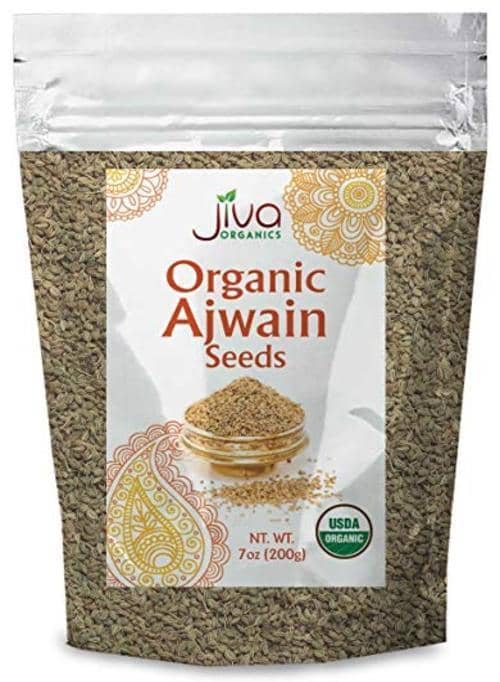
- Description
- Review
Description
100% USDA certified Organic Ajwain Seeds.
Ajwain seeds also known as bishop’s weed, ajowan or adjwain is a common household spice in an Indian kitchen. Ajwain or carom seeds are derived from herbs grown in India. The color of ajwain seeds varies from slight olive green to brown. It is native to India and is used as an ayurvedic for its strong essence. In addition to its abundant health benefits, it also enriches the flavor of all your dishes. Ajwain seeds (carom seeds) have a bitter and pungent taste with a flavor similar to anise and oregano. For this reason, it makes for a very good addition to pickles. They are commonly dry-roasted or fried in ghee. This allows the spice to develop a more subtle and complex aroma. In Indian cuisine, it is often part of a chaunk, a mixture of spices fried in oil or butter, which is used to flavor lentil dishes. Ajwain also has a particular affinity to starchy foods like savoury pastries and breads, especially parathas. Snacks like Bombay mix and potato balls get an extra kick from ajwain. It is also good with green beans and root vegetables.
Ajwain benefits are commonly used in treating abdominal anomalies like indigestion and acidity, some of its other health benefits include treating the common cold, tooth pain, anti-fungal, and germicidal properties helping in wound healing. It is also used as a mosquito repellent and in easing arthritic pain. The seeds can be used as a drink when boiled in water for treating indigestion and as a paste when to applied on the skin.
How to use ajwain seeds in daily cooking?
- You can add the seeds to curries or dry recipes by heating ghee in a pan and then adding the seeds along with other spices like cumin seeds, turmeric, salt, and coriander powder.
- You can also roast ajwain seeds. This heightens both its aroma and flavor. Dry roast by constantly stirring the seeds in a pan, on a low-medium flame. You can even roast them by adding little ghee or butter. These roasted seeds are then added along with the above-mentioned spices to curries or dry recipes.
Health Benefits of Ajwain Seeds :
Ajwain seeds come with the twin benefit of health packed with a beautiful aroma. Let’s take a look into its numerous health benefits-
- Good for digestion- Ajwain provides instant relief from indigestion and acidity. Adding a bit of ajwain into your daily meals keeps your stomach strong.
- Treats cold- It is believed to prevent nasal blockage. Consuming 2 tsps paste of ajwain seeds with jaggery every day helps you fight cold.
- Treats toothache- If you are looking for instant relief from a toothache, take 1 teaspoon of ajwain and salt, and gargle with lukewarm water. Simply gargling with this water makes for an excellent mouthwash too.
- Water- Ajwain water, also called Oma water is considered magical in Ayurveda. It is often given to babies and pregnant women to reduce the discomfort caused by gas. To prepare, boil 2 teaspoons of roasted ajwain seeds in water. Strain this mixture and drink. This is also known to boost your rate of metabolism thus aiding in weight loss.
How to prepare Ajwain Paratha -
Ingredients
- Whole wheat flour dough- 1 cup
- Salt as per taste
- Ajwain- 2 pinches
- Ghee- 1 tablespoon (for roasting)
Method
- Roll the dough using some dry flour, add a bit of melted ghee, salt, and ajwain seeds evenly
- Fold into a triangle or round shape as per your wish
- Place it on a heated Tava. Flip when one side is cooked. Spread some ghee and keep pressing till both sides are cooked.
- You can make it more crispy by applying a generous amount of ghee.
- Relish on its own or with pickle or curry
How to store Ajwain?
Store it in an airtight glass container, in a cool and dry place.
Graines d'ajowan biologique
Les graines d’ajwain, également appelées graines d'ajowan ou d'adjwain est une épice commune dans la cuisine indienne. Elle est originaire d'Inde et est utilisée comme pour ses bienfaits dans en ayurvédique. En plus de ses bienfaits pour la santé, elle enrichit également la saveur de plusieurs plats. Les graines d'Ajwain (graines d'ajowan) ont un goût amer et piquant avec une saveur semblable à celle de l'anis et de l'origan. Ils sont généralement rôtis ou frits dans du ghee. Cela permet à l'épice de développer un arôme plus subtil et complexe. Dans la cuisine indienne, il fait souvent partie d'un "chaunk", mélange d'épices frites à l'huile ou au ghee, utilisé pour parfumer les plats à base de lentilles. L'ajwain a également une affinité particulière pour les féculents, comme les pâtisseries et les pains salés, en particulier les parathas. Des collations comme le mélange Bombay et les boulettes de pommes de terre sont souvent agrémentés de graines d'ajwain. Cette épice convient également aux haricots verts et aux légumes-racines.
Les avantages des graines d'ajwain sont couramment utilisés dans le traitement des troubles de digestion tels que l'indigestion et l'acidité. Certains des autres avantages pour la santé comprennent le traitement du rhume, des douleurs dentaires, des propriétés antifongiques et germicides contribuant à la cicatrisation des plaies. Il est également utilisé comme répulsif contre les moustiques et pour soulager les douleurs arthritiques. Les graines peuvent être utilisées comme boisson lorsqu'elles sont bouillies dans de l'eau pour traiter l'indigestion et comme pâte pour être appliquées sur la peau.
